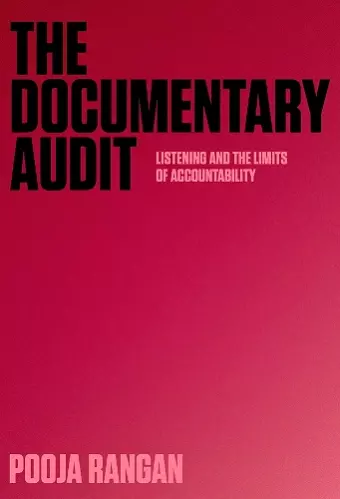The Documentary Audit
Listening and the Limits of Accountability
Format:Paperback
Publisher:Columbia University Press
Published:8th Jul '25
Should be back in stock very soon

Documentary films are often celebrated with aural metaphors: they give “voice” to the “voiceless” and ask the public to “listen.” But when did listening become synonymous with social justice? How exactly do documentaries train audiences to listen when they ask them to right historic wrongs or hold power to account?
The Documentary Audit challenges the association of listening with accountability and charts oppositional modes of listening otherwise. Pooja Rangan develops a framework for understanding how documentary practices have, under the mantle of accountability, provided a moral cover for listening habits that are used to profile, exclude, and incarcerate.
From the British Crown’s promotional films to Zoom meeting recordings, from disability-informed filmmaking in Japan to forensic efforts to expose anti-Palestinian violence in Hebron, Rangan explores how historical and contemporary practitioners have challenged and refused the lures of normative documentary listening habits in order to listen with an accent, listen in crip time, and listen like an abolitionist. Through an interdisciplinary approach that bridges documentary and sound studies while considering raciolinguistics, disability access, and legal forensics, Rangan demonstrates how the question of listening is central to the study of documentary. Far from being a neutral ethic, The Documentary Audit shows, listening creates the reality it purports to verify—with transformative political possibilities.
Understanding the act of listening in literal and metaphorical senses, The Documentary Audit consolidates Pooja Rangan’s position as a leading scholar of documentary media. Rangan moves across a diverse array of historical and contemporary materials to elaborate a new conceptual vocabulary—one that unsettles received ideas, asks hard questions concerning documentary’s political aspirations, and is sure to prove influential. -- Erika Balsom, reader in film and media studies, King’s College London
Listening with care to how voices sound and paying close attention to how they are produced have preoccupied me for the last twenty-five years—but on every page of The Documentary Audit there is a light-bulb moment where I am shocked, outraged—and reinvigorated. Rangan is the kind of intellectual and activist who will bring voice, sound, and documentary studies into the critical space Trinh T. Minh-ha has long urged us to hear. -- Nina Sun Eidsheim, author of The Race of Sound: Listening, Timbre, and Vocality in African American Music
The Documentary Audit challenges readers in the best possible way to approach documentary with care, attentive to its competing claims and to the industry forces that contain and constrain it. In this impressive work, Rangan proposes that with a deeper engagement and the practice of “otherwise listening," documentary can ultimately succeed in modeling new listening practices that might just begin to reach the radical proposition of documentary to lead to real change. But first we must all learn how to listen better. -- Alisa Lebow, creator of Filming Revolution
Pooja Rangan’s The Documentary Audit marks an exciting and essential contribution to documentary scholarship. Rather than focusing on what documentaries show, Rangan investigates how they teach us to listen, revealing the often unacknowledged power dynamics at work in documentary's auditory realm. Drawing on case studies ranging from GPO film units of the 1930s though contemporary forensic investigations, Rangan introduces the concept of "the documentary audit" - which conditions documentary listening , distributes attentional resources, and shapes political relationships. Through lucid and engaging analyses, Rangan illuminates how conventional documentary listening practices have been complicit in linguistic profiling, ableist exclusion, and carceral logics. Meticulously researched and theoretically sophisticated without sacrificing clarity, The Documentary Audit makes an essential contribution to documentary studies, sound studies, and media ethics. It will be an indispensable resource for scholars, media makers, and anyone concerned with the politics of representation and the ethical responsibilities of documentary. And to top it off, it’s a genuine pleasure to read. -- Leshu Torchin, Department of Film Studies, University of St Andrews
ISBN: 9780231217989
Dimensions: unknown
Weight: unknown
280 pages